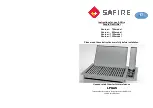
15
JCB-18BLDD
Instruction & User Manual
Torque Setting
Only use the torque setting ring when the
tool is stopped and the chuck is not rotating.
Otherwise the tool can be damaged.
WARNING!
m
Before you start working you should test
your selection to find a suitable torque
setting on a sample of the same material as
the work piece.
m
The lowest torque is with the arrow
pointing to 1. Higher numbers mean higher
torque.
m
To use the highest torque the tool can
produce, set the mode selector to the drill
symbol. In this mode the torque inhibitor is
not activated.
m
For driving screws, especially in wood, a low
torque should be selected to reduce the
risk of damaging the screw head, thread or
work piece.
m
A high torque setting is best for drilling.
Mode Selector
Drilling Mode
Use the correct specification of drill bit for
the material and power tool you are working
with. Incorrect selection may cause damage
to the tool, workpiece or bit.
WARNING!
Check that the drill is correctly inserted
and the chuck is properly tightened before
starting the tool.
NOTE
m
If loose, clamp the work piece. The work
piece should lie flat on a workbench, and/or
be securely fixed.
m
Mark out the position of the hole by suitable
means.
m
Use a suitable drill for your material.
m
Ensure all drills are sharp.
m
When drilling in metal, make sure that the
drill is always sufficiently cooled with a non-
flammable liquid.
m
Start drilling at low speed.
m
If you are drilling large holes, pre drill with a
small drill and then finish off with a large drill.
m
Do not force the tool - do not press too
hard on the drill.
The drill can jam in deep holes. Release the
power switch immediately if the drill jams.
Switch to anticlockwise rotation and run the
drill loose at low speed.
NOTE
Screw Driving Mode
Check that the drill is correctly inserted
and the chuck is properly tightened before
starting the tool.
NOTE
m
Do not over-tighten screws.
This risks
damaging the screw head or thread.
To tighten screws:
m
Set the rotation selector to clockwise
rotation.
m
Place the bit into the screw head in line with
the screw. Otherwise the screw can be
damaged.







































